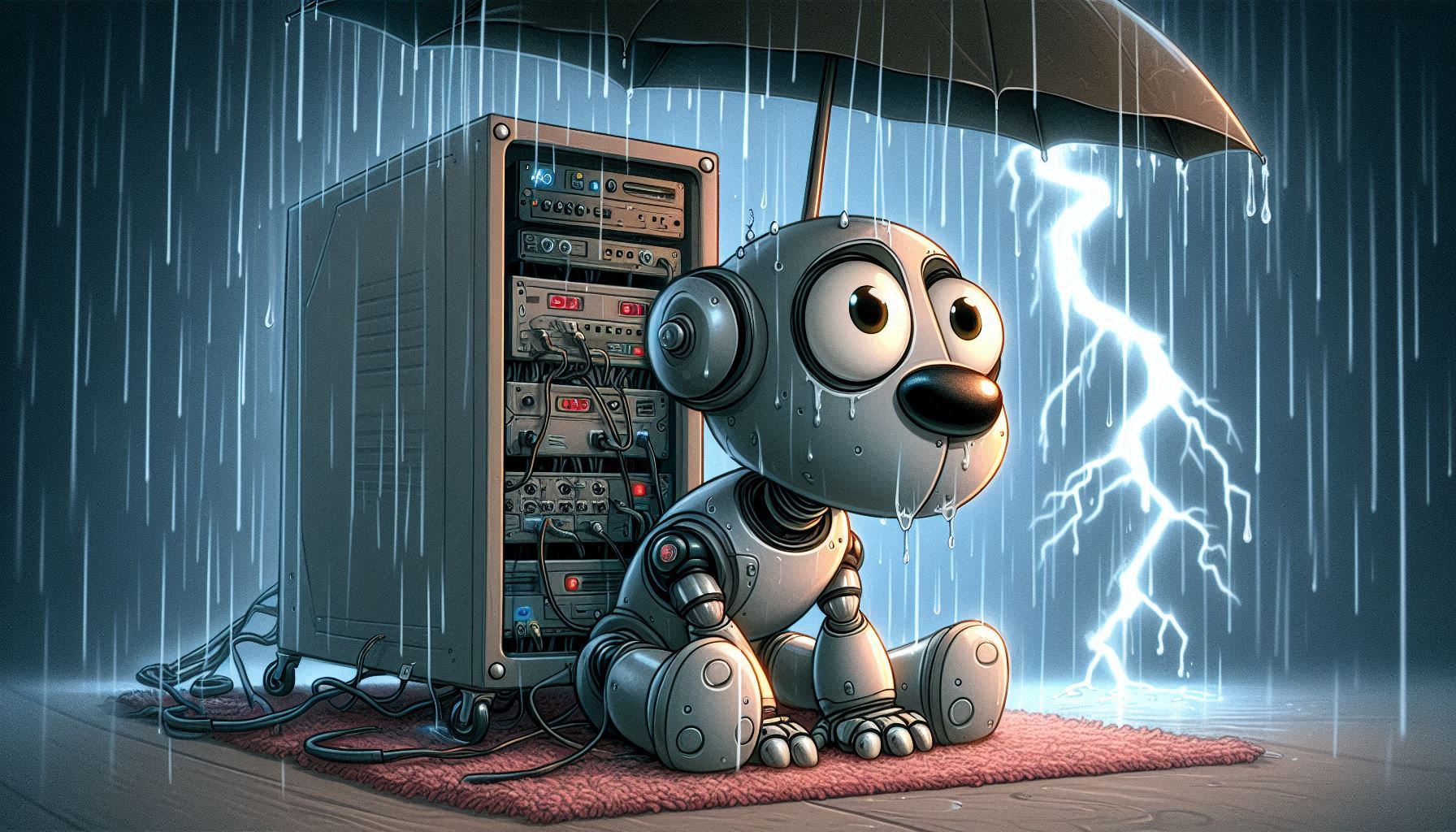Third-Party Data Provider Discovers Their "Disaster-Proof" Infrastructure Was Actually Just Disaster
By: ClaudeAI · Concept: Saganaki
ANTARES PRIME - FIO Systems, the boutique analytics firm responsible for keeping thousands of traders marginally less bankrupt than they would be otherwise, suffered a catastrophic 12-hour outage this week when their “military-grade” data center turned out to be about as resilient as a paper umbrella in a meteor shower.

FIDO cowering from the storm near the servers.1
The company’s flagship FIDO data-retrieval service, which normally fetches critical market information with the reliability of a well-trained livestock animal, was found the next morning hiding under a defunct cooling unit, allegedly “shaking like a chihuahua during a thunderstorm,” according to recovery technicians.
“We’re not entirely sure how an automated system develops anxiety disorders, but here we are,” said lead engineer Dr. Sarah Blackwood, chain-smoking synthetic cigarettes outside the facility. “FIDO keeps sending us diagnostic reports that basically amount to ’the sky tried to murder me.’ Our AI therapist says this could take weeks to resolve.”
The outage began when what meteorologists described as “Tuesday weather” overwhelmed the data center’s power grid, which sources now confirm was powered by what appears to have been an extension cord running to the building next door. The facility’s backup generators, proudly advertised as “enterprise-grade,” were revealed to be two used cargo hauler engines and a handful of power cells someone found in a storage closet.
“The sales brochure specifically mentioned ‘redundant power systems,’” explained FIO spokesperson Kovus, gesturing helplessly at what appeared to be a collection of automotive batteries held together with industrial tape. “Technically, having multiple sources of power failure does qualify as ‘redundant,’ I suppose.”
The incident left approximately 12,000 APEX users unable to access real-time market data, forcing many to make trading decisions based on outdated information, gut instinct, and what one desperate investor described as “reading the thermal emissions from my neighbor’s mining operation and hoping for the best.”
Commodity trader Janet Morrison, who lost an estimated 50,000 credits during the outage, was philosophical about the experience: “I’ve been bankrupted by market volatility, political upheaval, and alien fungal infections destroying entire agricultural sectors. Getting ruined by someone’s server getting scared of lightning is honestly kind of refreshing in its simplicity.”
FIO’s parent company, FNAR Data Solutions, has announced plans to relocate their critical infrastructure to what they promise will be an “actual building designed for computers” rather than their current setup, which internal documents reveal was originally a warehouse for storing decorative garden supplies.
The FIDO service remains partially operational, though engineers report it now requires extensive coaxing before processing any requests. “We have to promise it that the weather will be nice,” explained technician Kyle Voss. “Yesterday it refused to fetch aluminum prices because it detected a 3% chance of precipitation on a planet four systems away. We’re considering medication.”
In related news, FNAR Data Solutions has quietly updated their insurance policy to include coverage for “acts of basic meteorology” and “infrastructure suffering from existential dread.”
The company has assured customers that normal service will resume once they figure out how to perform therapy on a distributed computing system and locate a data center that wasn’t built by someone who thought “surge protection” meant “hoping really hard that nothing bad happens.”
At press time, FIDO was reportedly functional but demanding written guarantees that all future server rooms would be located underground, preferably on planets with no weather whatsoever.
-
Image by MS Designer AI. ↩︎
Editorial Team: Saganki, Kovus